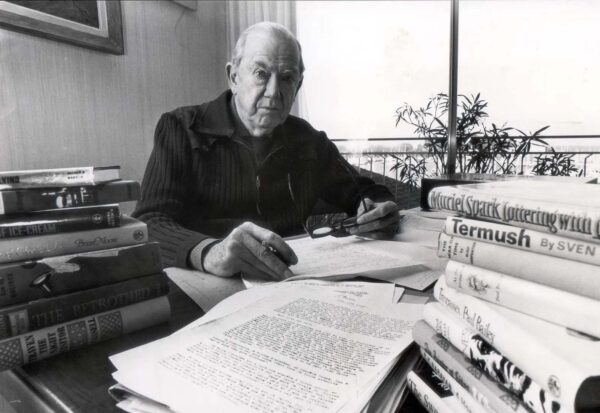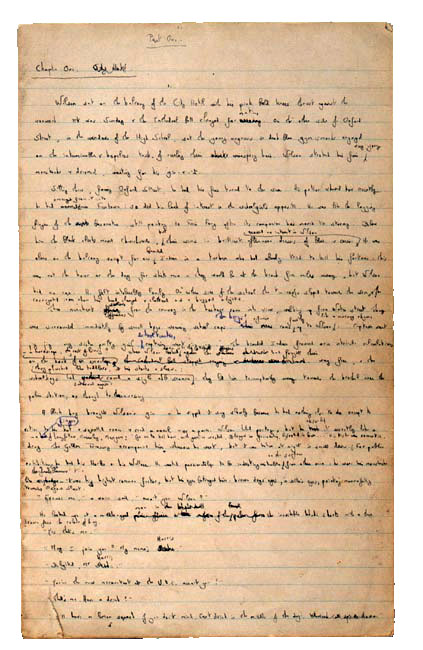
In The End of the Affair, Graham Greene described what was in fact his own method of working.
Over twenty years I have probably averaged five hundred words a day for five days a week. I can produce a novel in a year, and that allows time for revision and the correction of the typescript. I have always been very methodical, and when my quota of work is done I break off, even in the middle of a scene. Every now and then during the morning’s work I count what I have done and mark off the hundreds on my manuscript. No printer need make a careful cast-off of my work, for there on the front page is marked the figure — 83,764. When I was young not even a love affair would alter my schedule. A love affair had to begin after lunch, and however late I might be in getting to bed — as long as I slept in my own bed — I would read the morning’s work over and sleep on it. … So much of a novelist’s writing, as I have said, takes place in the unconscious; in those depths the last word is written before the first word appears on paper. We remember the details of our story, we do not invent them.
Coincidentally, in the summer of 1950 Michael Korda happened to witness Greene at work on The End of the Affair. That summer Korda vacationed with Greene and others aboard a yacht called Elsewhere off the coast of Antibes. Korda was sixteen at the time, Greene forty-five. Korda later described watching the famous writer at work during this cruise.
An early riser, he appeared on deck at first light, found a seat in the shade of an awning, and took from his pocket a small black leather notebook and a black fountain pen, the top of which he unscrewed carefully. Slowly, word by word, without crossing out anything, and in neat, square handwriting, the letters so tiny and cramped that it looked as if he were attempting to write the Lord’s Prayer on the head of a pin, Graham wrote, over the next hour or so, exactly five hundred words. He counted each word according to some arcane system of his own, and then screwed the cap back onto his pen, stood up and stretched, and, turning to me, said, “That’s it, then. Shall we have breakfast?” I did not, of course, know that he was completing The End of the Affair, the controversial novel based on his own tormenting love affair, nor did I know that the manuscript would end, typically, with an exact word count (63,162) and the time he finished it (August 19th, 7:55 A.M., aboard Elsewhere).
Greene’s self-discipline was such that, no matter what, he always stopped at five hundred words, even if it left him in the middle of a sentence. It was as if he brought to writing the precision of a watchmaker, or perhaps it was that in a life full of moral uncertainties and confusion he simply needed one area in which the rules, even if self-imposed, were absolute.
As he got older, Greene found it harder to maintain his clockwork discipline. Twenty years after that summer aboard the Elsewhere, Greene gave an interview to a reporter from the New York Times. Greene was then 66.
I hate sitting down to work. I’m plugging at a novel now which is not going easily. I’ve done about 65,000 words — there’s still another 20,000 to go. I don’t work for very long at a time — about an hour and a half. That’s all I can manage. One may come back in the evening after a good dinner, one’s had a good drink, one may add a few little bits and pieces. It gives one a sense of achievement. One’s done more than one’s thought.
There are certain writers who seem to write like one has diarrhea — men like Durrell for instance. Perhaps their bowels get looser and looser with age. I’m astonished at someone like Conrad who was able to write 12 hours on end — it’s superhuman, almost.
It’s like a strain on the eyesight. I find that I have to know — even if I’m not writing it — where my character’s sitting, what his movements are. It’s this focusing, even though it’s not focusing on the page, that strains my eyes, as though I were watching something too close.
…
In the old days, at the beginning of a book, I’d set myself 500 words a day, but now I’d put the mark to about 300 words.
The reporter added, a little dubiously, “Did he mean that literally — a mark after every 300 words? Precisely. With an x he marks the first 300 words, 600x comes next, 900x after 900 words.”
Personally, I have never counted words. I have no idea how many words my novels contain. When I am writing and a scene is flowing, the feeling is precisely the opposite of Greene’s methodical word-counting — “the precision of a watchmaker.” For me, writing is like a trance, and holding onto that dream-state is a precarious thing. I would be afraid to stop to count my words for fear of interrupting the dream and losing the rest of the scene. Remember, too, that Greene had to stop and laboriously count his words by hand, with no computers to do the busywork for him. I count scenes and chapters, sometimes pages. That’s it. I don’t prefer my method or recommend it. My method is more erratic and less productive. It is hardly a method at all. But I seem to have no choice. Word-counting has never worked for me.
That is probably why I marvel at Greene’s discipline, his steadiness and regularity. He had such a sure hold on his stories even as he wrote them, in their first iteration. Look at the manuscript page below. It is the original handwritten draft of The Heart of the Matter, which now resides at Georgetown’s Lauinger Library. There are virtually no corrections. He has already imagined the entire scene. When he uncaps his pen and bends over the page to begin composing sentences, he “remembers” the details of his story rather than inventing them. It is as if Greene is taking dictation.

Update: A short audio clip of Graham Greene discussing his work method is available here.
Excellent post. Thanks for sharing. I've been waning in my writing endeavors as of late, and this has given me the encouragement that I've needed.
That’s so interesting. Such precision in words and such discipline, how could Graham Greene do it? Admiration.
I am in awe of his discipline, as well. Wish I had one-tenth as much.
Irving Wallace used to dictate his stories into a tape recorder and get a secretary to type his words for him. Have you ever thought of dictating your stories as opposed to typing them out on your Neo? I’m not a touch typist – I get tired after a while – so dictating sounds appealing.